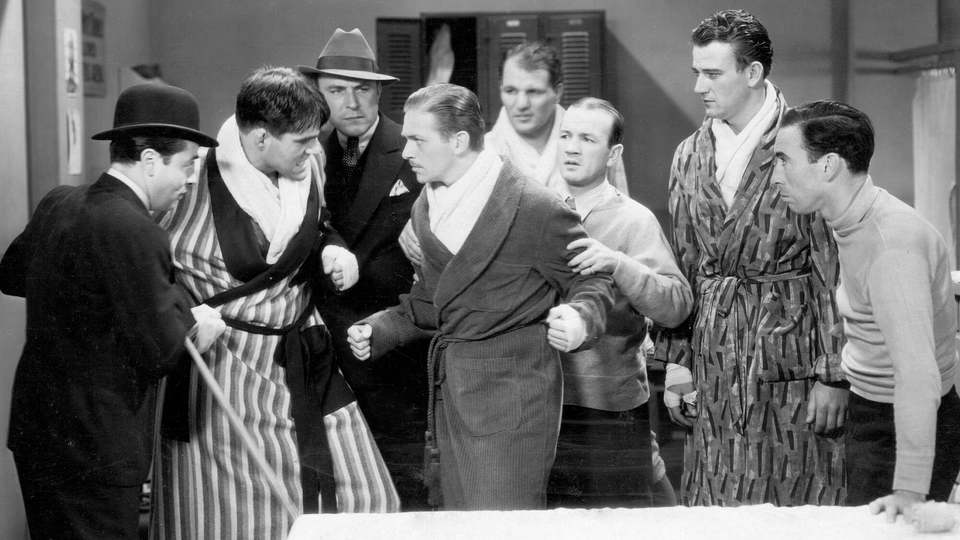The Life of Jimmy Dolan

Douglas Fairbanks Jr. plays the titular Jimmy Dolan, who opens the film winning the world light-heavyweight boxing championship. Radio reporters crowd the ring, asking Jimmy to say a few words. He says “Hello mom, are you listening? This is Jimmy. I just won and there ain’t a mark on me mom, not a mark. I’m coming home right away now and I got the money and you can get that house in Yonkers.”
In the training room, the celebration’s begun. Someone offers Jimmy a drink, but he says “No thanks. Don’t imbibe. That is, drink, I don’t drink. Clean living, that’s what does it!”
After his rub down, some society folks invite Jimmy to the casino where the mayor will give an address. Jimmy declines, saying he has to get home to his mother.
Cut to the interior of Jimmy’s posh apartment. Empty bottles lay strewn about. Jimmy lays sprawled out with his girlfriend, Goldie. They bicker in a drunken stupor. A knock at the door startles both. Jimmy straightens up, attempts to mask his drunkenness and answers the door. It’s his manager Doc, who’s brought a date and another couple to crash Jimmy’s party. They’re drunk too, and soon annoy Jimmy, who kicks the visitors out.
But one crasher reveals himself to be a reporter and promises to expose Jimmy’s wholesome image as a fraud. Jimmy tries to talk him out of it, offers him money, pleads. Happy to see Jimmy squirm, the reporter won’t budge. Jimmy punches the reporter who drops, knocked out. Satisfied he’s quelled the emergency, Jimmy passes out.
But when Doc tries to rouse the reporter, he discovers the reporter’s fallen on the fireplace grate and lies dead. The reporter’s date panics and screams. Doc slugs her and knocks her out. He then stages the scene to make her look culpable for the murder and takes the unconscious Jimmy and Goldie to Jimmy’s upstate training camp.
Realizing the reporter’s date will implicate them all, Doc steals Jimmy’s watch, money, car and flees with Goldie. Police intercept them and a chase ensues, ending with Doc and Goldie crashing. Their car erupts in a fireball, killing both passengers. The cops fight the flames with portable extinguishers reminiscent of old pesticide sprayers that accomplish nothing. With the bodies burnt beyond recognition, authorities assume Jimmy was driving and declare him dead.
Jimmy awakens the next morning to read the headlines. He visits his lawyer, who squeezes him for a few thousand dollars, then convinces him to flee town and start a new life.
Penniless, and reduced to hitching freight cars, Jimmy heads west. An encounter with railroad authorities forces him to jump-train in Utah. Wandering the desert, he chances upon a home for sick orphans. Exhausted, Jimmy passes out.
After the cynical setup, the script morphs into a redemption story. Aline MacMahon plays Auntie, who runs the home with Peggy, played by Loretta Young. Peggy nurses Jimmy back to health. She soon falls for him. There’s a cynical edge hinted at here, as Jimmy shows little emotional investment in her, but he’s also the only attractive man in her life. Regardless, this romance, and the children’s faith, transforms Jimmy from cynic to idealist.
When Jimmy learns Auntie needs money to avoid foreclosure on the home, he enters a local prizefight: five-hundred dollars per round against the heavyweight King Cobra.
In presenting Sammy Stein as Cobra, the film exposes its biggest weakness. Fairbanks Jr. doesn’t convince as a champion boxer. His features are too slight, his nose unmarred by a boxer’s mileage. In contrast, Stein, with his jutting jaw, blunted nose, and drooping brow, looks plucked from the local underground bare-knuckle circuit. This could be a deal-breaker, but Fairbanks Jr. compensates by convincing as a cynical, desperate fugitive.
John Wayne plays one of the other boxers challenging Cobra. In an intriguing turn, his character is scared. His performance proves unique in Wayne’s oeuvre, delivering a steady stream of dialog while pacing and fidgeting. He’s stiff, but it’s fascinating to see him acting instead of performing.
Anyway, you can imagine how the fight goes but two moments surprised.
The first, a jump cut from the end of the fight to Jimmy in handcuffs, captured by Phlaxer, a detective hounding Jimmy’s trail played by Guy Kibbee, had me thinking the film was going the post-code route. This proves a daydream, but had me second-guess where the film was going.
The second proves the film’s most memorable moment. Phlaxer has Jimmy at the station, ready to board the train back east that will see Jimmy imprisoned for his crime. No daydream this time. Jimmy has said his goodbyes to Peggy.
Then this exchange:
PHLAXER: Let me see, it was back in 1894. I was the leading man in a little show doing one night stands. The going was pretty tough.
PHLAXER (cont): One night, we tried out a new play. I remember it well—we got paid that night.
PHLAXER (cont): It was all about the old family mortgage and the poor, honest girl. I was the leading man and I got the girl.
JIMMY: And the mortgage too?
PHLAXER: Yeah, the good old sob stuff. It got em every time.
PHLAXER (cont): But that was back in ‘94. This is 1933 son, and they don’t fall for it anymore.
Had the film ended with that exchange and the pair boarding the train, I would have given it four stars. It doesn’t, of course, but I couldn’t help think the screenwriters were winking at us.